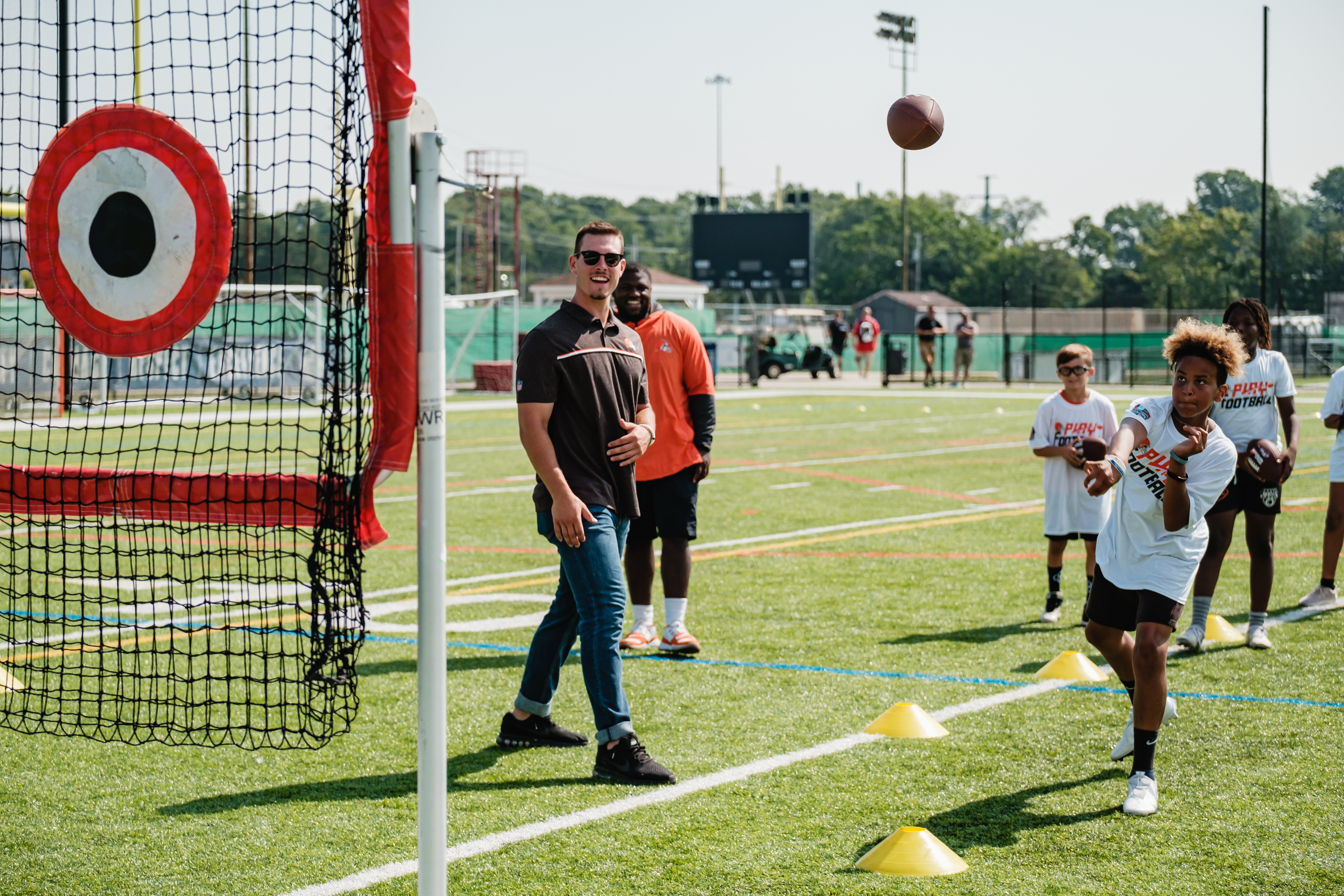Good sportsmanship is one of the cornerstone values of football. As a parent, it's crucial to model good sportsmanship for your children.
By practicing good sportsmanship, your child will learn to respect the game, their teammates, the officials, and their opponents. Good sportsmanship can set up your child for success on the field – it is a foundational principle that leads to success in life beyond sports.
The NFL and its partners, RCX Sports, official operator of NFL FLAG, NFHS, and USA Football, are dedicated to promoting good sportsmanship on the field and on the sidelines. Learn how you as a parent can demonstrate sportsmanship and foster a culture of respect.
Discussing Good Sportsmanship
Many leagues and teams have a code of conduct which all athletes pledge to follow. It's a good idea to discuss conduct with your child before a new season. Both NFL FLAG and NFHS have a general code of conduct that you can go over with your child. The codes of conduct below are adapted from the NFHS code of conduct.
PLAYER CODE OF CONDUCT
As a member of this team, I agree to follow this code of conduct:
- I will respect the game by playing fairly and to the best of my ability.
- I will lead by example, practice good sportsmanship and demonstrate self-control.
- I will not criticize calls made by officials and will allow my coach to handle any issues with them.
- I will always support and encourage my teammates and prioritize the team’s success over my own.
- I will represent my team with class, handle winning and losing with grace, and ensure that my behavior always reflects positively on my teammates, coaches and school.
- I will accept that mistakes are a part of sports and will use them as opportunities to grow.
PARENT/GUARDIAN CODE OF CONDUCT
As a team parent/guardian, I agree to follow this code of conduct:
- I will encourage my child to play fairly and to the best of their ability.
- I will practice good sportsmanship by demonstrating positive support for all players, coaches, fans and officials.
- I will not criticize calls made by officials and will allow the coach to handle any issues with them.
- I will prioritize the emotional and physical well-being of my child above any personal desire to win.
- I will do my best to make sports fun for my child and help them enjoy the experience.
- I will remember the game is for the players and not for the adults.
What Not to Do on the Sidelines
It’s easy to get caught up in the thrill of the competition. Your kids are passionate about their athletics, and you want to see them do well.
Sometimes, even the most composed parents might lose sight of the fact that these are kids, this is a game, and they need to maintain maturity and discretion when they go out there to support their children. To ensure that you are contributing to a positive environment for all players, officials, coaches, and fans, here are four things you should never do on the sidelines of your child’s game.
1. Never say derogatory things about the players
Especially if they can hear you as you scream your judgmental commentary from the sidelines. But even if they can’t, you should keep it to yourself. Saying hurtful things about children and their play is never appropriate.
It’s okay to bring bad choices or unsportsmanlike behavior to the attention of the coach or an official, as long as you do so respectfully and without saying things to hurt the child involved.
2. Never interfere with coaching
Even if you don’t agree with a coach’s decision in a game, it’s not appropriate to yell from the sidelines that your child should disobey their coach.
If you feel like your child is in an unsafe situation, removing them from play is the answer. But if you just don’t like the coach’s strategies, your plan of action should be to make a note and bring it up later. That way, your child doesn’t have to be confused or embarrassed while in the middle of play.
3. Never attack the officials
You don’t have to agree with their calls, but you do have to accept them. When you disrespect their authority, you teach your children to do it as well. Officials around the country are leaving the profession in great numbers due to the verbal abuse they experience throughout a season. It is important to make sure they are treated with respect so leagues can recruit and retain officials to allow kids to continue to play the game they love.
4. Never yell at your child during or after the game
It destroys your child’s confidence, impedes their development and diminishes their trust in you. Instead, provide positive feedback and use phrases that instill confidence, such as “We’re rooting for you” or “You can do it.”
Find the full version of this article on the USA Football blog.
Information on this page courtesy of NFL FLAG, NFHS, and USA Football.
































